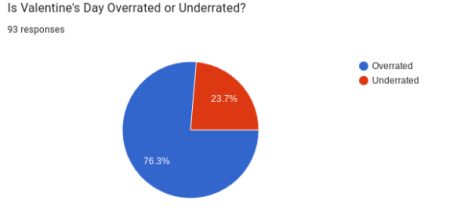Stress, depression are not necessarily the same
April 16, 2019
The four years of high school can prove to be the most challenging, most changing time of a teenager’s life. There’s so much to do and so little time to do it.
Many, if not all, students deal with a significant amount of stress during high school, especially the period of time after winter break and before spring break, but stress does not always equate depression.
And yet, sometimes when students are extremely stressed, they need to express it somehow, so they express it by ranting to a friend and using the heavily weighted word “depressed.”
There is a difference between Depression with a capital D, which is a diagnosed illness, and depression with a lowercase d, which is a feeling in response to life events. Such life events could include the loss of a loved one or unexpectedly failing a test.
Students who feel they need to express their stress can say they are feeling “down” or overwhelmed” instead of using the word depression.
The word “depression” has become extremely commercialized by high school students, but it’s not one that should be used lightly.
According to the National Institute of Mental Health, which is dedicated to research on the understanding and treatment of mental health, depression consists of “signs and symptoms that last weeks or months and interfere with the child’s daily life.”
The Fifth Edition of the Diagnostic and Statistical Manual of Mental Disorders states that in order to be diagnosed with depression, many factors like sleep irregularity, lack of concentration, diminished interest in activities, inappropriate guilt and little energy must be present.
A key factor of depression is that it develops and occurs over an extended amount of time, and many don’t realize that aspect to the definition. Instead, students use the term to express a feeling in the moment, but students need to understand the weight of the word “depression.”
Recognizing that every student feels stressed and needs relief is imperative. After all, stress is a normal part of the high school experience.
For example, Junior Caitlyn Mathews explained her stress is caused by “too much homework, or my clubs are just starting to take up too much time, but mostly homework– lots of homework.”
Although it’s hard to admit, homework is an essential part to learning and keeps one’s brain engaged while at home. Many teachers give a generous amount of time to get work done, and sometimes it is the students’ fault if they aren’t productive during work time in class, which can cause stress.
Teachers also try to help manage homework stress. For example, psychology teacher Dean Petros said he tries to make his homework load “as manageable as possible” with a three-day window to get it turned in.
But when there’s homework, clubs, sports, life at home, being socially active and maintaining good physical health, it can just be too much for some people.
“There’s only so much energy to go around and only so many hours in the day,” social worker Jonathan Mahoney said.
So, yes, feeling stressed is a normal part of the high school experience, and if students are stressed, they should seek assistance from a school staff member on how to manage that stress.
The problem, though, isn’t feeling stressed; it’s when students use the term depressed so loosely as a synonym for stress.
Senior Jonathan Gibbons agrees that it is unethical behavior “if you’re willing to take the struggle of something that’s serious [and] kills people” as a way to get attention about the feelings associated with stress.
A culture of faking poor mental health negatively impacts those who are truly and honestly struggling with depression.
And there is a staggering number of students who are, as suicide is the second leading cause of death among 15-29 year olds, according to the World Health Organization, a specialized agency of the United Nations.
When those who aren’t medically depressed use the term, those who are medically diagnosed can feel a lack of acknowledgement and could consequently develop worse symptoms.
The main reason many students express their stress with the “wrong” word is that the curriculum simply doesn’t teach the term or other terms to them.
Petros explained, “If my AP students don’t have an understanding of psychiatric illnesses yet, I would venture that the typical MHS student wouldn’t either.”
At this time in one’s young life, it’s most important to think of each other and value everybody and their feelings.
A solution to this problem is that there could be more information out there about what depression is and what resources are available for students who need it– either for depression or simply for stress. Then, students can healthily sort out their problems with a professional rather than with their equally stressed peers.
The crazy ride of high school does not have to be dealt with alone, but everyone should deal with it in a way that respects those who truly do suffer from depression.
